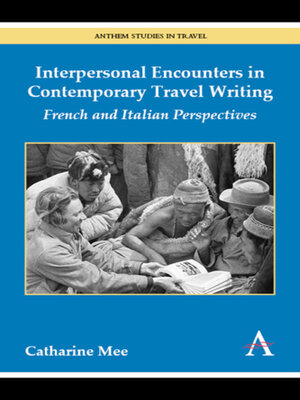Interpersonal Encounters in Contemporary Travel Writing
ebook ∣ French and Italian Perspectives · Anthem Studies In Travel
By Catharine Mee

Sign up to save your library
With an OverDrive account, you can save your favorite libraries for at-a-glance information about availability. Find out more about OverDrive accounts.
Find this title in Libby, the library reading app by OverDrive.



Search for a digital library with this title
Title found at these libraries:
| Library Name | Distance |
|---|---|
| Loading... |
This critical study examines the theme of interpersonal encounter in a range of late twentieth- and early twenty-first-century travel writing written in French and Italian. Structured typologically, each chapter focuses on a typical activity that brings traveller-protagonists into contact with other people. Drawing on literary critical studies of travel writing, sociological and anthropological approaches to tourism, as well as research in French and Italian area studies, 'Interpersonal Encounters in Contemporary Travel Writing' locates the concept of encounter within the context of modern tourism.
|This critical study examines the theme of interpersonal encounter in a range of late twentieth- and early twenty-first-century travel writing written in French and Italian. Structured typologically, each chapter focuses on a typical activity that brings traveller-protagonists into contact with those they encounter: guiding and interpreting, hosting, staring and photography, challenging, and accompanying. Drawing on a wide variety of writing, the study offers a unique focus on this central but overlooked aspect of travel, demonstrating the key place that encounter occupies in the contemporary travel culture.
With reference to the literary critical study of travel writing, sociological and anthropological approaches to the study of tourism, as well as research in French and Italian area studies, the volume locates encounter firmly within the context of modern tourism. Elucidating the nature of encounter in unprecedented ways, the study demonstrates how the treatment of encounter determines the generic boundaries of travel writing and how narratives of encounter reveal the gap between ideals and practices in travel. The volume also analyses the dynamics between the traveller and 'travellee', as they are represented in narrative form, re-evaluating traditional notions of the traveller's power and examining the potential for travellee agency, with particular reference to discourses of authenticity and ethics.







